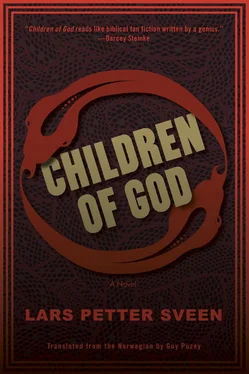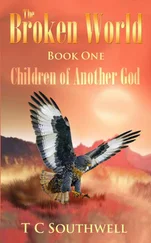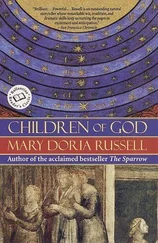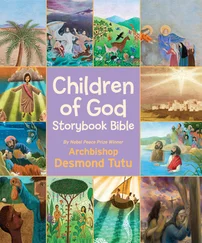“They’re not unclean, and we’re not clean,” said Jesus, still facing the stranger in front of them. “They’re us, and I ask you: join us.”
Jesus called out: “To all the things they’ve put on you, I say be gone.” With his hands raised to the sky and his eyes rolled back, he said the last words: “Leave him.”
And the creature fell to his knees, reaching out his arms and feeling his way along the ground. The crowd’s talking subsided, and no shouting could be heard anymore.
Jesus turned toward Peter and Thomas. “Help him,” he said, and they went up to the man, took him by the arms, and held him between them. His skin was cold, he stank of something rotten, a sickening, sweet smell. They could hear him whispering. A slight tremble shook his body, but everything that had seemed so great and evil was now minuscule and shattered.
Jesus turned to all the others gathered there. He raised up his hands and said, “Demons have occupied this land, they’re the army of darkness. A legion of them is moving across the land, through the valleys, blowing across mountains, dragging us out of our homes, throwing us to the ground, and hanging us up with nails on wood. This army of darkness is hunting us down and spreading fear, we’re pushing each other away. We’re full of the evil of their sharp swords and spears. Their evil fills us until we can’t take any more, until we carry out the most abominable acts. Their darkness makes its abode in us, their evil becomes our evil. But remember the words of Isaiah: my father, the Lord, will be a strength to the needy in distress, a refuge from the storm, a shadow from the heat. The breath of an aggressor is like a storm against a wall, like heat in a drought-stricken land. That was what the prophet Isaiah said, and I say to you, I will drive out those demons. I say to you, I will push them out, I will throw them into the abyss.”
When Jesus had finished speaking, he stood in front of the man being carried between Peter and Thomas. He put his hands on him, leaned forward, and whispered in his ear.
“Master,” said Peter, nodding his head toward a group of elder men approaching. Jesus turned around, held up his hand, and told the men to wait. He asked some other followers to come and help the man from the caves. They carried him away, gave him something to put around his body and something to drink. Jesus signaled that he was ready. The group of old men went over to him. They greeted Jesus and stared at him, before one of the eldest went closer and spoke to him quietly so that only Jesus could hear.
“What do you want from the Lord?” said Peter, interrupting. Jesus looked over at Peter.
“They’re asking us to leave,” he said. Peter turned to the man talking to Jesus. His head was like the bark of a withered tree; a tattered, white beard covered his face.
“We’ve lost so much,” the man said. “We have nothing left. I beg you to leave. If the occupying forces were to come here, if they heard what had been said, they’d wipe us out.”
Peter said nothing. He turned to Jesus. Jesus nodded and said yes. He put his hand over his mouth, nodded again, and said they’d leave as soon as possible.
The glimmer of light at the end of the world spreads out. Andrew looks at the golden tree trunks around them. Peter watches his brother emerge from the night. His short, black hair, his nose long and bent at the bridge, the shadow of his beard around his face, and his eyes glistening.
“The soldiers will be keeping watch over everything and everybody until Passover,” says Peter. “There will be guards at the Temple.” Andrew looks toward Peter. The light has returned, it’s faint, so faint, but the night has passed, and now comes the day. The grass and the trees about them regain their shapes and their colors.
Andrew goes over to Peter. He’s about to say something, but then he just shakes his head and puts his arms around his brother.
Several days later, while the group of followers are settling down at the edge of a few small houses outside Caesarea Philippi, Peter notices Judas heading off to sit alone on the ground by a group of trees. Mary’s saying how she marvels at the fact all spiders have eight legs, and while Jesus remains quiet, John starts to praise the majestic web of those eight-legged creatures that can capture even the fastest of small insects. Peter excuses himself, takes the remnants of a loaf of bread, and goes over to Judas.
Judas stares up at him. His eyes are red, his face is wet, and he smells.
“I brought some bread,” says Peter, sitting down on the grass next to him.
“I’m tired,” Judas whispers. “I don’t know if I have the strength anymore.”
“It’s all right,” says Peter. “We can rest now.”
“No, it’s better when we’re on the move,” Judas whispers. “It’s when we sit still, when we sleep, that it’s worse.”
“What are you talking about?” Peter asks him, trying to meet Judas’s eyes.
“They’re here,” Judas whispers. “They’re waiting for us.” Peter opens his mouth to say something, but he closes it again and gives the bread to Judas.
“Here,” he says. “Have something to eat.”
Judas takes hold of the bread, and at that very moment, they hear Jesus speak: “How are you doing, Judas?”
“He’s ill,” says Peter. Jesus nods, having come over to them. He sits down on the grass, his feet together.
“I can see my father, I can see my brother, they’re here,” says Judas, his voice still like a whisper. “They’re waiting for us.”
“You’ve told me about your brother,” says Jesus.
“Yes,” says Judas.
“And about your father,” says Jesus. Judas nods. “It was in a valley not far from where we’re sitting now, wasn’t it?” Jesus asks. “Your father pointed out your brother’s body when ordered to do so by the soldiers, and then they hanged your father. You told me that you wanted to go out at night and take him down so you could bury them both, but your mother made you stay at home. You promised your mother to fight for your people, but not to die like your brother and father.”
Judas cries. He dries his face, spits and coughs, and looks up at the sky.
“I can see them,” he says. “They’re here among us. They’ve rotted, and there are nails sticking out of my father.”
“This is your story,” says Jesus. “Everybody here has their own story, this whole country does. It’s our story. But we’re in the light of the Lord, our father now. We grow with new stories, we’re not alone anymore.”
“They’re here,” says Judas. “I can see them.”
“It’s not them,” says Jesus, cutting him off. “It’s not them you see.”
But Judas carries on. “They want to cut us down, all of us,” he says. Jesus leans forward to put his hands on Judas’s hands.
“Listen,” he says. “I’m here with you. Don’t be afraid for your life. Who among us can add a cubit to his life? Your father in heaven knows all that you need. Seek out the Kingdom of God, and his justice, and you will have all you need.” Then Jesus lifts up his hands and passes them over Judas’s face. The sun above them is going down as they sit in the shade of the trees.
“Who do people say the Son of man is?” Jesus asks.
Judas coughs before he answers: “Some say John the Baptist, others say Elias, while still others say Jeremiah or one of the other prophets.”
Jesus nods, his gaze still fixed on Judas. “And what about you?” Jesus asks. “Who do you say that I am?” The insects buzz in the trees, children shout from the houses some distance away, a woman calls to a man.
Peter lays his hands on Judas’s shoulders, and together they say, “You are the Messiah, the Son of the living God.”
Читать дальше











